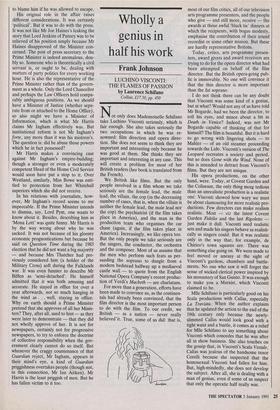Wholly a genius in half his work
Frank Johnson
LUCHINO VISCONTI: THE FLAMES OF PASSION by Laurence Schifano
Collins, f17.50, pp. 450
Not only does Mademoiselle Schifano take Luchino Visconti seriously, which is fair enough. She also takes seriously the two occupations in which he was re- nowned: film direction and opera direc- tion. She does not seem to think they are important and interesting only because he was good at them. She thinks they are important and interesting in any case. This will create a problem for most of her British readers (her book is translated from the French).
We British like films. But the only people involved in a film whom we take seriously are the female lead, the male lead, the villain, the cop (in the decreasing number of cases, that is, when the villain is neither the female lead, the male lead nor the cop) the psychiatrist (if the film takes place in America), and the man in the production team who organises the car chase (again, if the film takes place in America). Increasingly, we like opera too. But the only people we take seriously are the singers, the conductor, the orchestra and the composer. Most of us assume that the men who perform such feats as per- suading the soprano to dangle from a modern bedstead halfway up a mediaeval castle wall — to quote from the English National Opera Company's recent produc- tion of Verdi's Macbeth — are charlatans.
For more than a generation, efforts have been made to convince us, as the continen- tals had already been convinced, that the film director is the most important person to do with the film. To our credit, we British — as a nation — never really believed 'it. True, some of us did: that is, most of our film critics, all of our television arts programme presenters, and the people who give — and still more, receive — the awards at those awful 'black tie' dinners at which the recipients, with bogus modesty, emphasise the contribution of their sound recordist or some other minion. But these are hardly representative Britons.
Today, critics, arts programme presen- ters, award givers and award receivers are trying to do for the opera director what had been attempted on behalf of the film director. But the British opera-going pub- lic is immovable. No one will convince it that the thin director is more important than the fat soprano.
I do not think there can be any doubt that Visconti was some kind of a genius, but at what? Would not any of us have told Mr Bogarde, had we been the director, to roll his eyes, and mince about a bit in Death in Venice? Indeed, was not Mr Bogarde capable of thinking of that for himself? The film is beautiful. But it is hard to go wrong with lingering shots — to Mahler — of an old steamer proceeding towards the Lido. Visconti's version of The Leopard recreates a society and period, but so does Gone with the Wind. None of this is intended to detract from Visconti's films. But they are not unique.
His opera productions, on the other ' hand, were. Today, at Covent Garden and the Coliseum, the only thing mor,g tedious than an unrealistic production is a realistic one. Visconti showed how wary we must be about clamouring for more realistic pro- ductions. Few directors can make realism realistic. Most — viz the latest Covent Garden Fidelio and the last Rigoletto - just make it dull. Visconti used realistic sets and made his singers behave as realisti- cally as singers could. But it was realistic only in the way that, for example, de Chirico's town squares are. There was something else going on. We were made to feel moved or uneasy at the sight of Visconti's gardens, chambers and battle- ments. No one who saw it will forget the sense of wicked clerical power inspired by his monastery of San Guisto. It was enough to make you a Marxist, which Visconti claimed to be.
Mlle Schifano is particularly good on his Scala productions with Callas, especially La Traviata. When the author explains that he updated the action to the end of the 19th century only because the newly- slimmed Callas would look good with a tight waist and a bustle, it comes as a relief for Mlle Schifano to say something about Visconti which concedes that he was after all in show business. She also touches on the gossip that, in Visconti's Scala Vestale, Callas was jealous of the handsome tenor Corelli because she suspected that the homosexual Visconti had fallen for him.
But, high-mindedly, she does not develop the subject. After all, she is dealing with a man of genius, even if some of us suspect that only the operatic half really was.










































 Previous page
Previous page